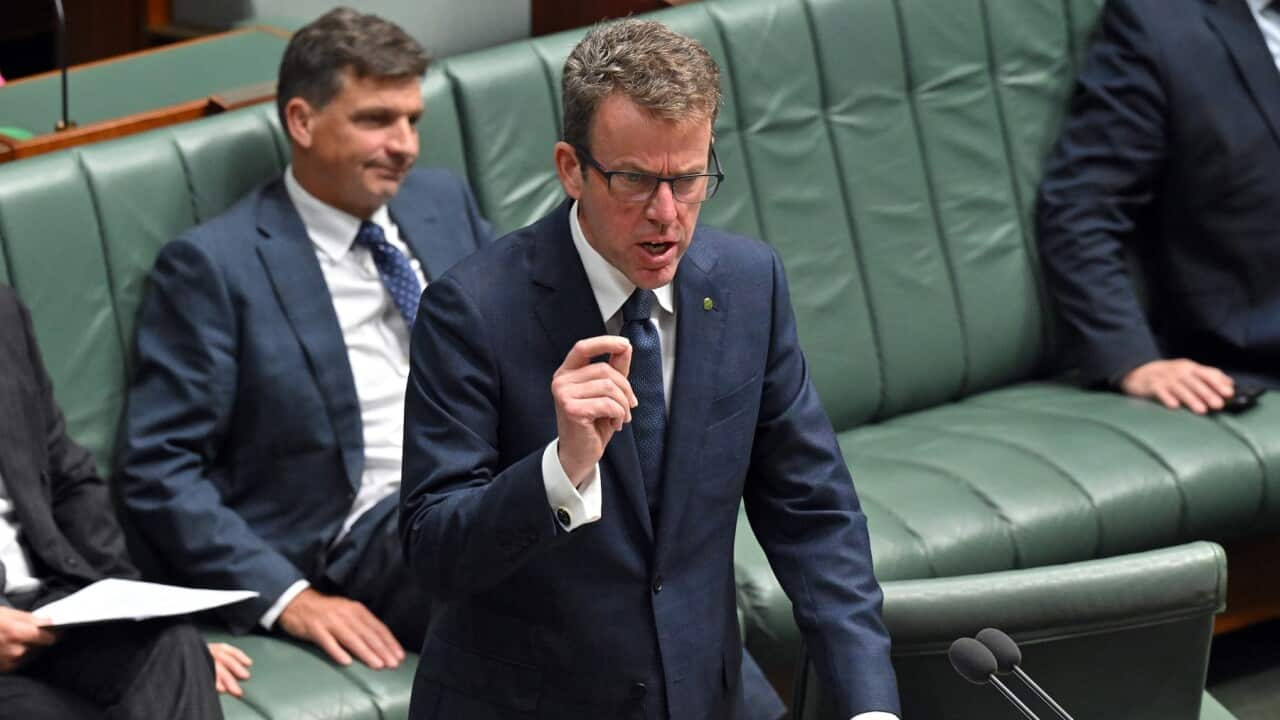TRANSCRIPT
The Albanese government have announced a fast-tracked bill addressing community safety concerns and political pressure from the Coalition following the release of a number of migrants.
This follows an ongoing battle over the government's response to a landmark High Court ruling which determined that indefinite immigration detention was unlawful.
The ruling has since resulted in the release of 84 migrants so far, a number of whom had been idling in immigration limbo due to violent offences in the past.
Opposition leader Peter Dutton has branded all of the migrants "hardcore criminals" despite government documents reviewed by the Guardian Australia revealing just 48 of the 92 migrants likely affected by the ruling had been flagged as having a criminal or violent history.
"The fact is, Mr Speaker, Australians are being put at risk. This is a very serious matter. We're talking about 84 now, another one's been released overnight. 84 hardcore criminals. As the West Australian rightly points out, these are people now who are staying in motels at taxpayers expense."
Opposition spokesperson for Immigration, Dan Tehan, has gone as far as suggesting the government should defy the will of the High Court and lock the migrants up yet again.
"Don’t sit there and listen to all the reasons why it might be difficult or there might be trouble in doing it, learn to be a minister, actually direct your department to get you the outcome that the Australian people want. And it’s very clear what that outcome is ... they want these people re-detained. We need a new regime in place to do it."
While the government initially said it would wait until the High Court released its reasoning behind the ruling before introducing legislation, pressure mounted on the government after the revelation that three murderers and several sex offenders were among those released.
The government tabled a fast-tracked bill in the house which Immigration Minister Andrew Giles says will tighten surveillance of those released and add new criminal offences for those who fail to report to relevant authorities.
"The government is proposing to amend the migration Act to include appropriate amendments to the bridging visa conditions protecting the community, increasing capabilities and obligations, and securing ongoing engagement with the Department of Home Affairs. Including mandatory reporting obligations and discretionary curfew and monitoring requirements which will be imposed on a case-by-case basis, only where necessary to support the safety of the community. And also, new criminal offences, which failed to comply with reporting and monitoring conditions."
Following protest from the opposition, Richard Marles who is serving as Acting Prime Minister in Anthony Albanese's absence has approved a number of amendments further restricting movement of the released migrants and raising penalties for breaches to the new law.
The bill then passed to the Upper House where Liberal leader in the Senate, Simon Birmingham, confirmed his party's support despite promising to scrutinise the bill.
"They have not done the preparatory work. And it is clear that this government has been dragged to the position of presenting this legislation to Parliament last Thursday. The opposition asked where the legislation was and why it wasn't coming forward. We want to see it passed. We will pass it today. But we will scrutinise it and we reserve the right to propose amendments to it."
And the opposition, which remains united with Labor on its foreign policy objectives, has used Prime Minister Anthony Albanese's absence from parliament due to a trip to the United States as a chance to attack the leader.
Deputy Liberal leader Sussan Ley has called Mr Albanese "out of touch" in a post on social media.
The Opposition Leader Peter Dutton stood firm in his attacks of the Prime Minister, insisting he should have cancelled his trip to the Asia-Pacific Economic Cooperation summit to deal with the parliamentary dispute.
"This is a very dark day for our country. The Prime Minister is not here to deal with one of the most significant domestic issues in recent time. The Prime Minister should be here Mr. Speaker in the chamber here in Canberra, instructing the public servants to do what it was that should have been instructed six months ago that."
And abroad, on the sidelines of the A-PEC summit in California, Presidents Joe Biden and Xi Jinping have met in hopes of stabilising an increasingly volatile US-China relationship.
The leaders last spoke a year ago in Bali on the sidelines of the G-20.
Since then, fraught ties between the economic superpowers have been strained by issues such as the US downing of a Chinese spy balloon and over differences on the self-ruled island of Taiwan.
But there were calls for global stability in a translated message from President Xi, calling for leaders to find a way for their countries to co-exist in peace:
"The China-US relationship, which is the most important bilateral relationship in the world, should develop in a way that benefits our two peoples and fulfills our responsibility for human progress. China-U.S. relationship has never been smooth sailing over the past 50 years or more, and it always faces problems of one kind or another. Yet it has kept moving forward amid twists and turns. For two large countries like China and the United States, turning their back on each other is not an option. Planet Earth is big enough for the two countries to succeed, and one country's success is an opportunity for the other."
Following the meeting the two countries agreed to resume direct military-to-military communications.
Anthony Albanese, who recently visited China in an effort to improve Australia's relationship with the country, applauded this diplomatic shift saying dialogue is key to avoiding major conflicts.
"We need guardrails to make sure that we don't have misunderstandings or miscalculations that could lead to real issues and real conflict. Dialogue is always positive. I'm a firm believer that through dialogue comes understanding."













